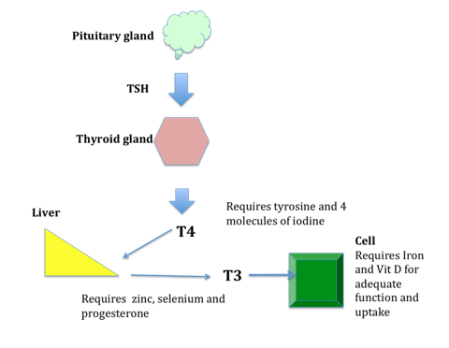The thyroid gland is a small gland that sits at the front of your neck. It secretes hormones that regulate energy. Thyroid hormone is important for growth, cell development and metabolism.

As you can see from the above diagram, thyroid stimulating hormone or TSH is secreted from the pituitary gland in the brain. This stimulates the thyroid gland to secrete a hormone called T4 which needs tyrosine and iodine for its formation. T4 has limited activity until it is converted to T3 in the liver. For this conversion to take place, adequate zinc, selenium and progesterone must be present. To be of use in the cells, promoting their development and regulating growth and metabolism, T3 requires the presence of vitamin D and iron.
Copper can interfere with the adequate metabolism of thyroid hormones. “Stress”, or raised levels of cortisol, can encourage the body to produce Reverse T3 (RT3), an inactive form of thyroid hormone. Thus levels of T4 and its resultant T3 can look OK in blood tests, but high RT3 levels can lead to this hormone sitting in the cell receptors without stimulating any activity. This can cause hypothyroid like symptoms (read below).
This cycle is what we call a negative feedback. If there is too much thyroid hormone, the thyroid gland signals the pituitary to secrete less TSH so that your blood levels of thyroid hormones will fall. If there is too little thyroid hormone in the blood, the pituitary will secrete more TSH to stimulate the thyroid gland to secrete more thyroid hormone.
What could go wrong with my thyroid?
Essentially the thyroid can be either under or over active. An underactive thyroid is called hypothyroidism. An overactive thyroid is called hyperthyroidism.
Hypothyroidism
If your thyroid is underactive you may experience the following symptoms-
- Hair loss
- Constipation
- Difficulty losing weight or weight gain, despite healthy diet and exercise
- Cold hands and feet
- Fatigue
- Dry skin
- Depression
- Slow heart rate
- Intolerance to cold
- Goitre (enlarged thyroid)
- Infertility
- Heavy periods
Causes of hypothyroidism can be deficiencies of iodine, zinc, selenium, vitamin D; also autoimmune disease, radiation treatment and certain medications
Hyperthyroidism
If your thyroid is overactive this is called hyperthyroidism. Symptoms you may experience are
- Racing heart
- Weight loss
- Diarrhoea
- Sweating
- Anxiety
- Protruding eyes (exophthalmia)
Causes of hyperthyroidism include Graves Disease (autoimmune), inflammation, and thyroid nodules. It can also occur following a pregnancy.
What is Hashimoto’s Disease?
Hashimoto’s is where the body has formed an immune response to the thyroid gland, causing it to produce insufficient thyroid hormones.
If my thyroid blood levels are “normal”, could my thyroid still be contributing to the way I feel?
The short answer is yes. Firstly, reference ranges for blood test are based on averages from the general population, and are not necessarily specific for you. Secondly, you can see from the above diagram that there are many co-factors involved in thyroid metabolism. Depending on your symptoms, you may under or over utilise certain aspects of your thyroid hormone production. Please speak to your health practitioner.
Please also be aware that Medicare currently covers only the cost of a TSH level. T4/T3 and RT3 tests are only covered by Medicare if the TSH level is abnormal, or you are on thyroid hormone replacement medication.
Iodine deficiency and other halogens
Many people that we test are iodine deficient. This is due to diets low in iodine and the displacement of iodine from the body by other similar molecules (halogens) such as chlorine, fluoride and bromides. Chlorine and fluoride are in our water, bromides are prevalent in citrus soft drinks, some breads, pesticides on some fresh foods and as fire retardants on many material items.
Iodine replacement maybe recommended by your health practitioner. Please do not use iodine until advised by your doctor as it can be dangerous. It is also important to source clean, non-toxic sources of iodine.
In summary
- Speak to your health practitioner if you have concerns about your thyroid
- Optimising thyroid metabolism pathways with a healthy diet and nutritional co factors can improve your thyroid function
- Ensure you seek accurate advice about supplementation for your thyroid, especially regarding iodine.



